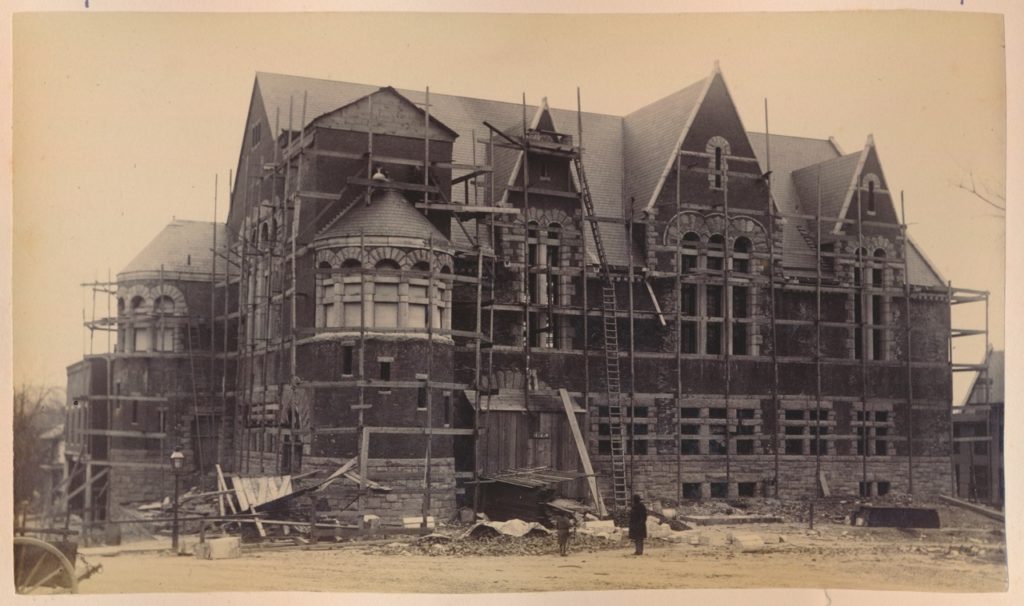HISTORICAL COMMISSION FORGOES DEMOLITION DELAYS ON THREE PROPERTIES

Town Hall Under Construction (ca. 1866). Photo: Amherst Historical Society
REPORT ON THE MEETING OF THE AMHERST HISTORICAL COMMISSION (6/24/20)
The meeting was held via Zoom webcast and was recorded.
Present: Commission Members Jane Wald (Chair), Jan Marquardt, Pat Auth, Jane Sheffler, Robin Fordham, Hetty Startup. Staff members Nate Malloy and Ben Breger
Public Hearing to Consider Demolition Delays on Three Properties
A public hearing was convened to determine if, for three structures of historical significance to the town, a demolition delay of up to one year should be imposed to allow the petitioners to find a way to preserve them by adaptive re-use or relocation of the structures. Specific criteria are listed in Article 13 of Amherst’s Zoning Bylaw.
1.30 Fearing Street
The owners would like to remove a single-story stucco 1930 one-car garage from the rear of a Tudor Revival home. The garage is too small for modern cars and is in poor condition largely due to age and poor drainage. The garage is not visible from the street and its demolition will not cause harm to two tulip trees said to be the largest in Massachusetts.
Because this residence is part of both the National Historic District and the Lincoln-Sunset Local Historic District, the Local Historic District Commission will review and make a definitive decision at its next meeting. At issue is whether the structure with historical significance is the house, the (attached) garage, or both. Some members wanted to know how many pre-war Tudor Revival houses exist in Amherst and some expressed interest in the prevalence of this style in college towns like Amherst.
The Commission members determined that the residence is of historic significance because it meets three of the necessary criteria, including being part of an established streetscape. However, they did not impose a demolition delay because they found that the garage does not contribute to the historical significance of the site.
300 North Pleasant Street
A request was made to demolish a plain building of non-descript architectural style that has been in continuous use as a veterinary practice for many years. It was originally the office of Dr. Fred Ruder. It is not visible from the street nor from nearby Kendrick Park, and is in poor structural condition. The current occupant plans to retire and is looking for a buyer for his practice. Demolition of the structure would mean that a new building could be built on the existing footprint if a Special Permit is granted. The Board found that the building does not meet any of the criteria for historical significance and allowed the demolition to go forward
3. 117 Amity Street
A request was made to demolish a 1920s one-car garage in poor condition that is attached to a house. The structure is not visible from the street. The owners intend to replace it with a similar garage that is two-feet wider and nine inches higher, with modern doors, so that the second story lines up with the floor of the master bedroom. Because it is part of the Gaylord/Prospect Historic District, final approval would have to come from the Local Historic District Commission. The Commission considered this to be a maintenance issue and did not recommend a demolition delay because the garage will be replaced with an architect-designed reproduction to ensure its continued use.
Civil War Tablets
During the public meeting following the hearings, the Commission decided to take another look at six Civil War tablets, originally in the basement of Town Hall, that were restored with CPA funds and have been in storage until a suitable location to display them is found. The request came from a group of citizens inspired by the Black Lives Matter movement who would like to work with the Town to display the tablets.
Demolition at 132 Northampton Road
The Commission must make a recommendation to the Zoning Board of Appeals (ZBA) regarding the demolition of the existing farmhouse at 132 Northampton Road that is to be replaced with a traditional Victorian-influenced 28-unit apartment building. Because this is a Ch. 40B Comprehensive Permit application, the demolition permit, like all other necessary permits, comes under the jurisdiction of the ZBA with advice from the relevant boards.
Writers’ Walk
One member asked for information on the status of the Writer’s Walk signs because this project has been in process for more than fifteen years. Apparently, a firm is ready and willing to take on the project of making the signs but due to errors in the procurement process, all of the paperwork has to be resubmitted.
Demolition Delay Bylaw
Lastly, there was discussion of updating the Demolition Delay Bylaw. Town Counsel recommended that it be a separate Bylaw, not part of the Zoning Bylaw. This is a contentious issue and had been discussed at length (see the 4 hour 40 minute mark of the June 15 Town Council meeting). The Commission has been working on a new bylaw that would clarify the criteria for “historical significance,” but prototype bylaws from other towns do not work for Amherst. The Commission decided to invite a consultant from the Massachusetts Historical Commission to give a workshop specifically for Amherst at a meeting in July.
